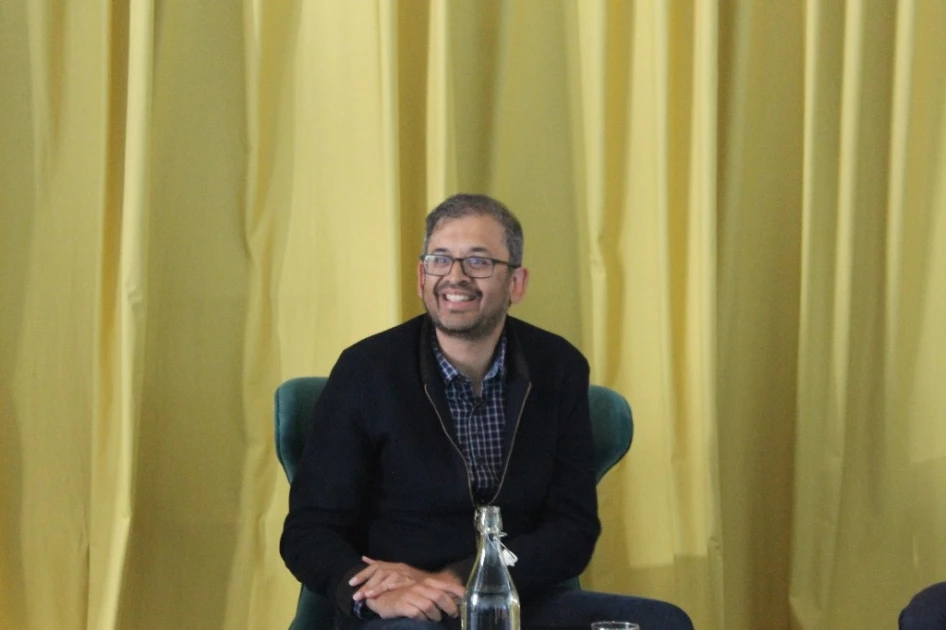‘Raise money when you least need it,’ Indian tech CEO Ananth Narayanan tells Kenyan startup founders

Mensa Brands founder Ananth Narayanan speaks in Nairobi on January 6, 2022. | PHOTO: Dennis Musau/ Citizen Digital
Ananth
Narayanan, the founder and CEO of Indian direct-to-consumer
(D2C) company Mensa Brands, has challenged Kenyan start-up founders to build
relationships with investors beyond seeking funding.
Narayanan, whose company Mensa became Asia’s fastest unicorn and the second fastest globally within 6 months of operation, said the best time for ventures to focus on knowing investors in between funding rounds when they think they don’t need them.
A unicorn is a tech company with a valuation of $1 billion (Ksh.123 billion) without being listed on the stock market.
“Let
them know your company. What you should be doing when not fundraising is meeting investors,” Narayan said on Friday during an event bringing together different
players in the Kenyan start-up ecosystem.
He
urged founders to chase investment opportunities in advance instead of basking
on the glory of successful rounds, saying “The best time to raise money for
your start-up is when to least need it. Raise now in case you need it in two years.”
Founded
in 2021 by the former McKinsey director who had served at the consulting firm
for 15 years, Mensa is an e-commerce company that focuses on tech-led lifestyle
brands across fashion and beauty.
The company acquires several D2C brands and earns from their
operations and has about 25 start-ups in its fold. It attained unicorn status
in November 2021.
Locally,
Kenyan start-ups have in general suffered a difficult operating environment in
the last three years amid rising inflation, weakening currency, and unfavourable
interest rates which have seen foreign investors shift capital from emerging
and frontier economies.
However,
e-commerce firms have especially had
a hard time with uptake due to hesitancy and last-mile delivery challenges, as
well as the absence of a reliable national courier service which has forced companies
to invest heavily in dispatch teams.
For instance, the NYSE-listed Jumia, which
is Africa’s biggest e-commerce platform, is still not profitable since its
launch in 2012 despite reports of growth in the African e-commerce scene.
Last year, Kenyan Amazon-style e-commerce
platform Sky Garden was acquired by tech credit platform Lipa
Later on the brink of closure following insolvency. The SaaS
(Software as a Service) platform that helps retail stores digitise offline and
online sales, said the overall market in 2022 has been a
struggle.
Narayanan
said Mensa has chosen not to invest in last-mile delivery and advised start-ups in markets where the infrastructure
network is not fully developed to invest in a few pick-up points at their
area of operation.
“Pick
your battles and focus on that. Get four pick-up pints in Nairobi, for instance,
and invest in those if the infrastructure is not developed in your market or
building small warehouses around the city,” he said.
He
further cited cash-on-delivery and try-and-buy methods as some of the
techniques which have helped Mensa penetrate the Indian market.
Much
like Kenya, Narayanan acknowledged hesitancy in the Indian market, with consumers and merchants not willing
to pay before a good is received.
To this, the Mensa CEO advised ventures to
ensure high standards of high-quality control in their products to win customer
trust, especially for markets that are infiltrated with knock-off products.
“The customer experience is always
paramount for start-ups, you need to be involved in the lookout for imitation
merchandise, the quality of fabric and things like that. Delivering the wrong
shoe is not as bad as selling the wrong sizing,” Narayanan noted.
The
business magnate spoke at an event hosted by Push Ventures, a Kenyan-based VC
firm targeting start-ups using technology to solve Africa-specific problems.
The
company participated in last year’s Ksh.1.2 billion ($10 million) Series-A round by Kenyan insurtech startup
Turaco.
Want to send us a story? SMS to 25170 or WhatsApp 0743570000 or Submit on Citizen Digital or email wananchi@royalmedia.co.ke
Comments
No comments yet.



Leave a Comment